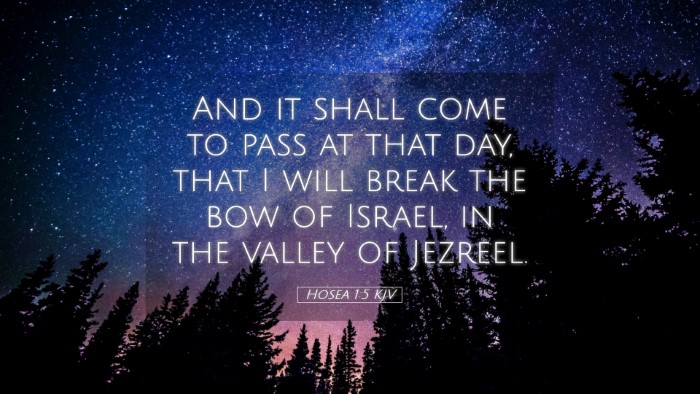Old Testament
Genesis Exodus Leviticus Numbers Deuteronomy Joshua Judges Ruth 1 Samuel 2 Samuel 1 Kings 2 Kings 1 Chronicles 2 Chronicles Ezra Nehemiah Esther Job Psalms Proverbs Ecclesiastes Song of Solomon Isaiah Jeremiah Lamentations Ezekiel Daniel Hosea Joel Amos Obadiah Jonah Micah Nahum Habakkuk Zephaniah Haggai Zechariah MalachiHosea 1:5
Hosea 1:5 KJV
And it shall come to pass at that day, that I will break the bow of Israel, in the valley of Jezreel.
Hosea 1:5 Bible Commentary
Commentary on Hosea 1:5
Verse Context: The verse reads: “And it shall come to pass at that day, that I will break the bow of Israel in the valley of Jezreel.” This statement by God through the prophet Hosea situates the message within a larger narrative of judgment and restoration, emblematic of the prophetic literature in Israel.
Overview
Hosea, often referred to as the 'prophet of love,' delivers messages of both judgment and mercy. This particular verse captures a pivotal moment in his prophetic discourse, indicating a transition from Israel's current state of sin to the impending consequences thereof.
Historical Context
The historical background of Hosea’s prophecy situates it during a tumultuous period characterized by political instability and moral decay within Israel. The valley of Jezreel, referenced in this verse, is notable not only for its geographical significance but also for its symbolic representation of God’s judgment against Israel’s idolatry and infidelity.
Theological Insights
- Divine Judgment: Matthew Henry points out that the reference to breaking the bow symbolizes the dismantling of Israel’s military power and self-reliance. This serves as a critical theological assertion regarding the sovereignty of God and His ultimate authority over nations and their fates.
- Covenantal Implications: Albert Barnes emphasizes that God’s action transcends mere judgment; it reflects a breach in the covenant relationship established with Israel. The bow, often representative of strength and defense, highlights how Israel’s reliance on military might, rather than God, led to its demise.
Exegetical Considerations
In its grammatical structure, the phrase “I will break the bow of Israel” suggests a future action grounded in the certainty of divine promise (or divine threat). Adam Clarke elaborates that the usage of “I will” denotes God’s proactive role in diminishing the defenses of Israel, which speaks to the overarching theme of divine providence and judgment.
Literary Structure
The verse contributes to the overall literary structure of the book of Hosea, establishing a stark contrast between judgment and restoration throughout the narrative. The prophetic oracle encapsulates a broader message concerning Israel’s unfaithfulness, reflected consistently in Hosea’s vivid imagery and existential themes.
Practical Applications
- Reflect on Reliance: The breaking of the bow serves as a critical reminder for contemporary believers regarding their reliance on external strength rather than divine help. It challenges pastors and theologians to consider where their congregations place trust and security.
- Community Reflection: Churches today can reflect on the implications of spiritual infidelity and the consequences of straying from God’s commands. This calls for a collective turn towards repentance and restoration, aligning with the themes of Hosea.
Conclusion
Hosea 1:5 serves as a solemn proclamation of both God’s authority and the gravity of Israel's sins. Through the combined insights of Matthew Henry, Albert Barnes, and Adam Clarke, we recognize the significance of God's intended action against Israel’s military arrogance, as well as the restorative hope embedded within Hosea's message. As we reflect on this verse, may we all be called to a deeper understanding of our covenant relationship with God, striving to remain faithful in all aspects of life.


